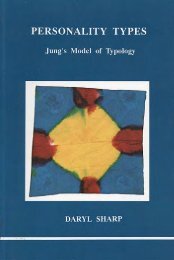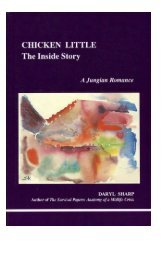Digesting Jung: Food for the Journey - Inner City Books
Digesting Jung: Food for the Journey - Inner City Books
Digesting Jung: Food for the Journey - Inner City Books
You also want an ePaper? Increase the reach of your titles
YUMPU automatically turns print PDFs into web optimized ePapers that Google loves.
94 Personality and Aloneness<br />
symbolized by images of <strong>the</strong> child in a person’s dreams. 84<br />
Anyone in <strong>the</strong> process of becoming independent must detach<br />
from his or her origins: mo<strong>the</strong>r, family, society. Sometimes this<br />
transition happens smoothly. If it does not, <strong>the</strong> result is twofold: <strong>the</strong><br />
“poor me” syndrome, characteristic of <strong>the</strong> regressive longing <strong>for</strong><br />
dependence, and a psychic experience of a potentially creative nature—<strong>the</strong><br />
positive side of <strong>the</strong> divine child archetype: new life, exciting<br />
new possibilities. The incompatibility between <strong>the</strong>se two directions<br />
generates a conflict that may precipitate a psychological<br />
crisis. The conflict is <strong>the</strong> price that has to be paid in order to grow<br />
up. On <strong>the</strong> one hand, we long to return to <strong>the</strong> past; on <strong>the</strong> o<strong>the</strong>r, we<br />
are drawn inexorably toward an unknown future.<br />
Initially, this conflict goes hand in hand with <strong>the</strong> feeling of loneliness,<br />
behind which is <strong>the</strong> archetypal motif of <strong>the</strong> abandoned child.<br />
Thus <strong>Jung</strong> observes, “Higher consciousness . . . is equivalent to being<br />
all alone in <strong>the</strong> world.” 85 In short, individuation and personality<br />
are gifts that are paid <strong>for</strong> dearly.<br />
The antidote to <strong>the</strong> feeling of loneliness, of abandonment, is <strong>the</strong><br />
development of personality. But this does not happen unless one<br />
chooses his or her own way consciously and with moral deliberation.<br />
And you can make a commitment to go your own way only if<br />
you believe that way to be better <strong>for</strong> you than conventional ways of<br />
a moral, social, political or religious nature—any of <strong>the</strong> well-known<br />
“isms.” Those who adhere to <strong>the</strong>m do not choose <strong>the</strong>ir own way;<br />
<strong>the</strong>y develop not <strong>the</strong>mselves but a method and a collective mode of<br />
life at <strong>the</strong> cost of <strong>the</strong>ir own wholeness.<br />
Personality is not <strong>the</strong> prerogative of genius, nor is mental prowess<br />
a significant factor in individuation. Just as in fairy tales, where<br />
so many psychic patterns are illustrated, <strong>the</strong> one who finds <strong>the</strong><br />
treasure “hard to attain” is as often as not a Dummling, an innocent<br />
fool who simply follows his instincts.<br />
84 “The Psychology of <strong>the</strong> Child Archetype,” The Archetypes and <strong>the</strong> Collective<br />
Unconscious, CW 9i, par. 287.<br />
85 Ibid., par. 288.










